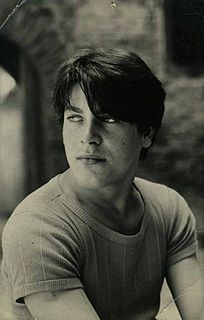
Niccolò Jommelli was a Neapolitan composer. He was born in Aversa and died in Naples. Along with other composers mainly in the Holy Roman Empire and France, he was responsible for certain operatic reforms including reducing ornateness of style and the primacy of star singers somewhat.

Carlo, Count Gozzi was an Italian playwright and champion of Commedia dell'Arte.

Le donne vendicate is a musical farce that consists of two intermezzi by composer Niccolò Piccinni with an Italian libretto by Carlo Goldoni. Goldoni's text had already been used twice previously, in operas by Gioacchino Cocchi (1751) and Giuseppe Scolari (1757). Piccinni's version was first performed at the Teatro alla Valle in Rome in 1763.
Domenico Fischietti (1725–1810) was an Italian composer.
Venetian literature is the corpus of literature in Venetian, the vernacular language of the region roughly corresponding to Venice, from the 12th century. Venetian literature, after an initial period of splendour in the sixteenth century with the success of artists such as Ruzante, reached its zenith in the eighteenth century, thanks to its greatest exponent, dramatist Carlo Goldoni. Subsequently, the literary production in Venetian underwent a period of decline following the collapse of the Republic of Venice, but survived nonetheless into the twentieth century to reach peaks with wonderful lyrical poets such as Biagio Marin of Grado.

Of Life and Love is a 1954 Italian comedy film directed by Aldo Fabrizi, Giorgio Pastina, Mario Soldati and Luigi Zampa.

Giovanni Marco Rutini was an Italian composer.
Pietro Chiari was an Italian catholic priest, playwright, novelist and librettist.
Il vero amico is a play by Carlo Goldoni written in 1750. It has been translated into English under the title The True Friend by Anna Cuffaro. The play is a comedy about two friends who are in love with the same woman.
Il cavaliere e la dama is a comedy play by Venetian playwright Carlo Goldoni. It was published in 1749.
Il feudatario is a comedy play by Venetian playwright Carlo Goldoni. It was published in 1752.
Gli amori di Zelinda e Lindoro is a comedy play by Venetian playwright Carlo Goldoni. It was published in 1763.
Il teatro comico is a comedy play by Venetian playwright Carlo Goldoni. It was written in 1750.

Bruno Zanin is an Italian film, theatre and TV actor and writer.
The chevalier d'Herbain, whose complete name was Jean-Louis Cuchot d'Herbain, was an 18th-century French baroque composer born in Strasbourg on 10 April 1720 and died in Paris on 28 May 1768.
Antonio Boroni was an Italian composer.
Gli amanti sposi is an opera giocosa in 3 acts by Ermanno Wolf-Ferrari to a libretto by Luigi Sugana, Giuseppe Pizzolato, Enrico Golisciani and Giovacchino Forzano, after Carlo Goldoni's Il ventaglio (1765). It premiered 19 February 1925 at La Fenice, Venice.






